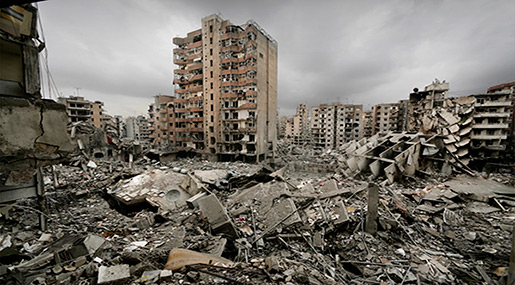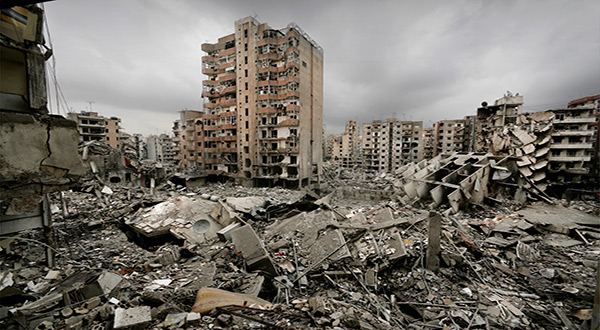The July War ... As If It Was Yesterday

Mohammad Nazzal
The displaced people opened the gates of the Sanayeh Park. They lined the ground with mattresses. Soon it will flood with the displaced. Men, women and children, including the elderly, are out in the open. The tents have not arrived yet. They will arrive later. You see an elderly woman, at the height of her anger, yelling at someone to give her another blanket. It is the height summer and the school year is over, but some schools will not open their doors to the displaced.

Some opened their doors. Others were forcibly opened by the hands of young men, who feared the pain of their elders and the fear of their youngsters, as they were being eaten inside by attempts to humiliate them. Some schools remained stubborn. The Lebanese love each other, of course, very, very much! Old, abandoned buildings, at risk of collapsing, were opened by the displaced and were inhabited. The place being abandoned is only a few miles away from their destination: from Beirut's southern suburb to the city; specifically, to "Western" Beirut. However, the displaced will not risk going to the east at all. One can go there if he wants, provided he has a full pocket. Then, he can find a flat for rent but with some difficulty. Renting involves an [implied] additional condition: having the right appearance and perhaps a tongue that does not reveal that he is from "the others". This is the safest and most guaranteed. It's an adventure. It is the legacy of the old war. This was the spirit of this country 11 years ago. It was the July war. The "Israeli" bombardment will touch everyone who has a problem with "Israel"; a real and actual problem, in the form of resistance.
The displaced people would not have left their homes had they not seen body parts mixed with the rubble. This is no longer an option. On the second day of the war [July 13, 2006] "Israeli" aircraft bombed a house in the southern village of al-Duweir. A family of 12 was exterminated. A father and mother and their ten children. The youngest was Safaa, a six-month-old baby. That was the family of Adel Akash - a family that left no orphans behind. Despite this and after the massacres intensified, the displaced returned to their homes, or what remained of them during the time set for the cessation of hostilities in the morning. Those who did not find their homes set up a tent near the rubble.
At the peak of that war and bloodshed, the then Lebanese "Defense Minister" Elias Murr was meeting with the American ambassador. The latter was concerned about the spread of Hezbollah rockets. Murr will reassure him mockingly, "Hezbollah will not be able to launch a rocket from Solidere, I have a lot of soldiers there." This is what was published in the WikiLeaks documents. Murr was the same man who told the American ambassador that during the war he had prevented the arrival of a truck loaded with rockets to Hezbollah and that he had confiscated it and sent them to the Ministry of Defense. In this, he was honest. This really happened. By doing that he thought he would win the war with the "Israelis" and the Americans [by the way, where is Murr, Interpol's puppet?].
During those days - as if it were yesterday for those who lived it as life or death - the bundle of bread was sold double its price to the displaced Lebanese in the "other" Lebanese areas. So was the gas tank, water and everything else. Perhaps this has not happened in every area, but it has certainly occurred in many areas. Those who have migrated to Mount Lebanon know this very well. Walid Jumblatt also knows this. All those who sat with Secretary of State Condoleezza Rice know this; those ministers, deputies and dignitaries, who were -honestly - afraid of the results of the war. They were, according to the literal text, "afraid that the current conflict would put Hezbollah in a stronger position in Lebanon than it was at the beginning." The US document added that the group supported the idea of continuing the "Israeli" bombardment for a week or two "if this would weaken Hezbollah's strength on the ground" [those present included Amine Gemayel, George Adwan and Boutros Harb]. They did not miss the opportunity to tell Rice that they believe in Fouad Siniora and support him in his position as prime minister. That meeting took place at the peak of the war. It is not a secret being revealed for the first time. It has become known, but needs to be repeated, at least every anniversary, to remain known. That is how that Lebanese group differed in politics with other Lebanese groups. It sought to keep the "Israeli" planes crushing the bones of the children, destroying the houses, and burning the land with everyone on it. They are still among us, as leaders, as ministers, deputies and influential people. This is Lebanon; a deadly, damned phrase, the most deadly to the spirit than any war.
Source: Al-Akhbar, Translated and Edited by website team
Comments




